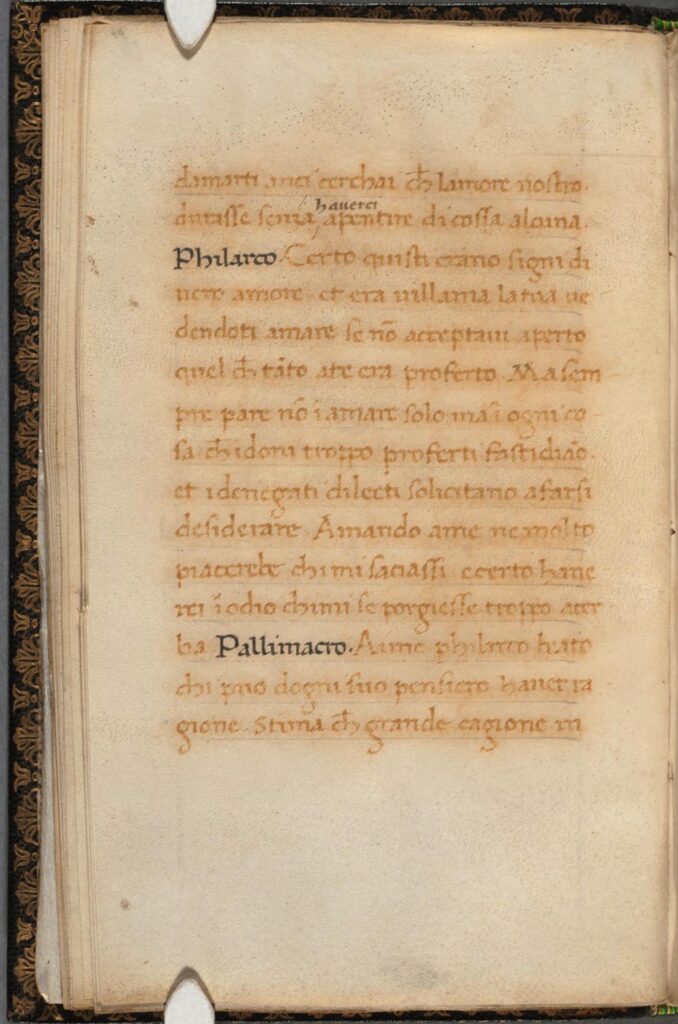Online Edition II
Folio 13 verso
damarti anci cerchai che lamore nostro,
durasse senza haverci apentire di cossa alcuna.
Philarco. Certo quisti erano signi di
vero amore / et era villania latua ve-
dendoti amare se non acceptavi aperto
quel che tanto ate era proferto. Ma sem-
pre pare non in amare solo ma in ogni co-
sa che idoni troppo proferti fastidiano,
et i denegati dilecti solicitano a farsi
desiderare. Amando a me ne molto
piacerebe chi mi saciassi, e certo have-
rei in odio chi mi se porgiesse troppo acer-
ba. Pallimacro. Aime philarco beato
chi puo dogni suo pensiero haver ra-
gione. Stima che grande cagione in
questo mi facea così essere restio. Quel medesimo sole, quale tu fiso miravi sta-mani quando e’ surgeva, ora fra ’l dì in alto cresciuto abaglia chi lo guarda. Cosi io da primo scorsi il mio male quando e’ nasceva, quale medesimo fatto grande acceca ogni mia ragione e consiglio. Né mi ritenni salire quella erta, onde ora stracco posso né scendere né affermarmi. FILARCO. E che adunque non fuggivi tu in tutto quel che tu tanto prevedevi essere dannoso? PALLIMACRO. Previdi, sì, Deifira mia, tutto conobbi, tutto da lungi scorsi, e in parte prima ne feci te certa di quel che poi m’è teco intervenuto. Ma se tu, Filarco mio, hai di me ora, quanto certo hai, compassione vedendomi, perché io ami altrui, sì penoso, come potevo io non avere piatà di chi amando me ardeva? FILARCO. Sempre fu debito d’umanità amare chi ami te. Ma dicesi officio ancora di prudenza in ogni cosa aversi tale che a nulla sia troppo. PALLIMACRO. Sai tu come uno grande e grave sasso con più fatica e tardezza si volge, ma poi che comincia a rotolare alia china fracassando, a nulla si ritiene. Uno piccolo e leggiero sassetto, poca cosa lo muove 6

loving you, but rather I sought that our love should last without our having to regret anything. Philarco. Certainly, these were signs of true love, and seeing that you were loved, you were unkind, not openly accepting what was offered to you. But it is always evident, not only in love, but in every matter, that gifts that are too insistently offered prove annoying, and that the satisfactions that are denied invite one to desire them. In matters of love, someone who overwhelms me with their attentions would not please me very much; and certainly, I would despise someone who treated me too bitterly. Pallimacro. Oh, Filarco, lucky is the one who can control every one of his thoughts. Consider what a great cause made me so reluctant. That same sun, which you stared at this morning when it rose, now at midday, at its highest point, blinds him who looks upon it. In the same way, when it first arose, I perceived the very misfortune, which now that it is grown blinds my reason and judgment. Nor did I hold myself back from climbing this steep slope, from which now, tired, I can neither descend nor stop. Filarco. And why then did you not flee all those things you could already foresee as harmful to you? Pallimacro. I foresaw everything — yes, my Deiphira — I knew all of it, I glimpsed it all from a distance, and at first I made sure you also knew what would happen to me because of you. But if you, my Filarco, have compassion in seeing me now in such pain, as you certainly do, because I am in love, how could I not have felt compassion for someone who burned with love for me? Filarco. It is always the obligation of humanity to love the one who loves you. But it is also said to be the duty of prudence, to avoid excess in every thing. Pallimacro. You know how a large and heavy stone starts rolling slowly and laboriously, but once it starts crashing down the slope, nothing can hold it back. A small and light pebble is moved by a little thing